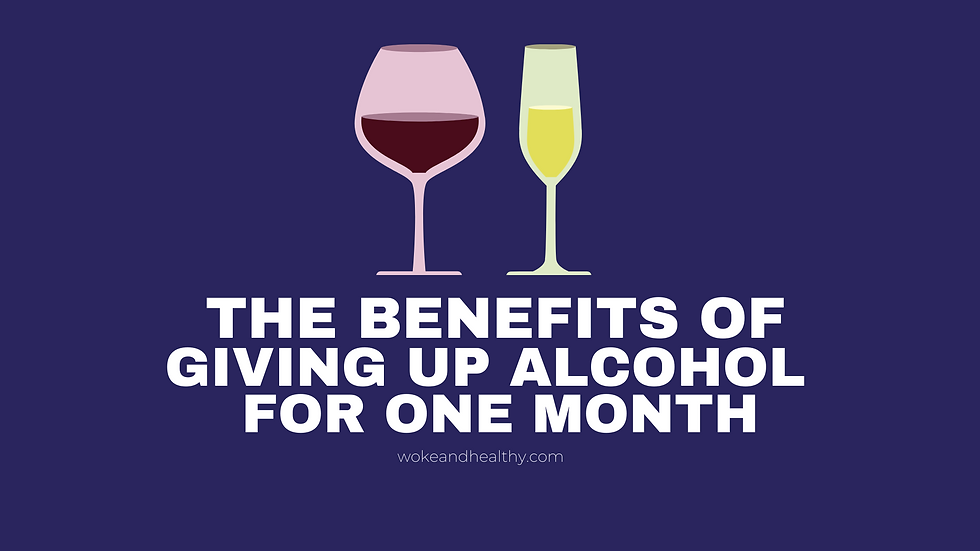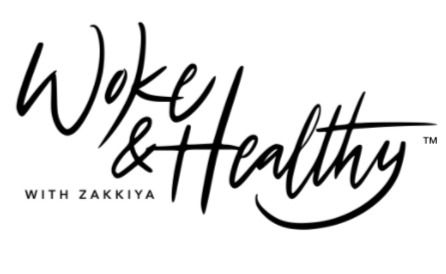The benefits of giving up alcohol for a month
- Zakkiya Miller

- Dec 6, 2021
- 5 min read

After back-to-back night's out with friends this past weekend, I made an undeniable observation Sunday morning: (1) it's easier to be alcohol-free in social settings than I thought, and (2) far less taxing on my almost 40 body.
A much-needed Friday night in the city with girlfriends near and far was long overdue. We hadn't all been together in one room in years. We were too excited to dress to the nines, meet on the upper west side for a "sex in the city-ish" night with yummy food and great company.
I ordered my first drink from the bar shortly after arrival as we waited for our table. If I decide to drink, it's always gin. The core ingredient in gin is juniper berries which are jam-packed with antioxidants. Gin also has flavonoids, an antioxidant that can improve circulation and reduce your risk for heart disease.
But I'm not here to give you a lesson on gin but more about how I finally felt the benefits of my decision to stop drinking almost entirely at the end of 2020. To date, I've probably had ten cocktails this year, maybe less, and just like with everything else I gave up this year, I don't feel like I'm missing anything without it.
I for sure wasn't missing the hangover a few of my girlfriends had on Saturday, and I for damn sure wasn't missing $16 cocktails. But to be fair, I was never a big drinker. Anytime I did overindulge, it always ended with my head over a toilet, "room spinning," and the loss of at least half of the next day, if not the whole day.
Though I love an occasion to be social, doing it sober has presented its challenges. Giving up alcohol wasn't that hard in a pandemic when social gathers screeched to a halt. But now, with the world reopening, there's been an uptick in invites hitting my inbox.
If you've ever been to social gatherings when you're not drinking, then you know you can't just tell someone you're not drinking without a barrage of questions. Why now? Is it a health issue? Are you doing a challenge? Can't you have at least one drink to celebrate?
When I answer, "because I feel better when I don't drink," I'm still met with opposition, but when I say, "alcohol is poison, and I try to avoid ingesting poison," the judgments either cease completely or prompt intrigue.
Now I could spend the following 200 words explaining scientifically why it's poison and how the side effects of alcohol (slurred speech, impaired vision, blackouts) are proof of that poison. Y'all ain't ready to hear that yet.
However, I am here to encourage you to take a dry week, month, or season for several reasons as it concerns your overall well-being. Personally, every time I've been intentional about giving something up, I'm overwhelmed at how much more comes into my life.
This was true for alcohol too. I found myself spending the evenings that would have included a cocktail while I prepared dinner or after the kids went to bed, now consisting of reading, journaling, bedtime yoga, and quiet introspection. But don't take my word for it, as with anything I recommend, it's science-backed.
Here's a timeline of what happens when you stop drinking and how quickly you can start to reap the benefits of a dry month:
Week One
Better sleep
After one week, you may notice that you are sleeping better. You typically fall straight into a deep sleep when you drink, missing the crucial rapid eye movement (REM) sleep. While you are supposed to have between six and seven cycles of REM sleep a night, you typically only have one or two when you've been drinking.
You will be more productive and a better learner and problem-solver. You'll have more control over your emotions and behavior.
You'll also have more opportunities to manage your food and drink intake. Sleep helps to balance the hormones that make you feel hungry or full. After drinking, your ghrelin levels (the hormone that makes you feel hungry) go up, and leptin (the hormones that make you feel full) go down.
Better hydration
You lose around four times as much liquid as you actually drank when you drink alcohol. Dehydration can cause headaches, as your organs take water from the brain due to their own water loss. Salt and potassium levels also reduce, impacting nerve and proper muscle function while causing fatigue and nausea.
Giving up alcohol keeps you well-hydrated (assuming you're drinking water), which in turn benefits your brain. Your mood and concentration will be more stable, and you won't suffer from dehydration side effects like lack of motivation, increased fatigue, and lethargy.
Calories saved
If you were to give up drinking six 175 ml glasses of wine a week, you would save around 960 calories, which is the equivalent to three burgers or five and a half bags of chips.
Week Two
After two weeks free of alcohol, you will continue to reap the benefits of better sleep and hydration.
As alcohol is an irritant to the stomach lining, you will also see a reduction in symptoms such as reflux, where the stomach acid burns your throat after two weeks.
You may even begin to lose weight as a result of giving up alcohol's empty calories. If you were to stop drinking six glasses of wine per week for two weeks, you would have saved 1920 calories.
Week Three
Drinking too much alcohol can cause your blood pressure to rise over time. After 3-4 weeks of not drinking, your blood pressure will reduce. Reducing your blood pressure can be crucial to lessen the risk of heart disease occurring in the future.
By now, giving up six glasses of wine per week would have saved you 2880 calories.
Week Four
Giving up alcohol can positively impact your skin and your better hydration levels. As more water will have been absorbed rather than wasted, you are likely to have more hydrated-looking skin, as well as reduced dandruff and eczema.
Removing alcohol from your diet for four weeks can also help to improve your liver function as your liver will start to shed excess fat. If your liver function is not too severely affected by alcohol, it can recover within 4-8 weeks.
With the liver playing a part in over 500 vital processes, you also give your body a better chance of removing contaminants, converting food nutrients, storing minerals and vitamins.
Now that you know the benefits of giving up alcohol for four weeks, would you be willing to try it? Consider finding an occasion like the new year to tag along your dry time. I'd personally avoid holidays, summertime for obvious reasons but anytime is better than no time.
For more tips or suggestions for succeeding at a dry month, leave me a comment. I can even share some of my favorite non-alcoholic bevies that still give you that calm and relaxed feeling without the poison.







Comments